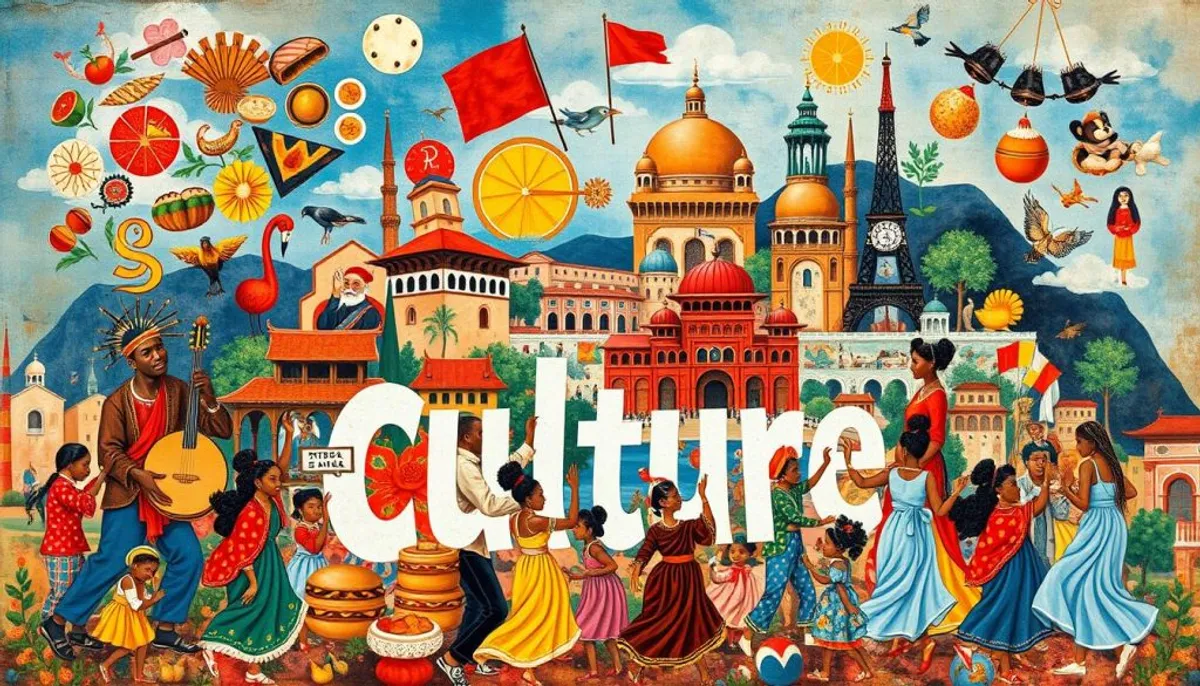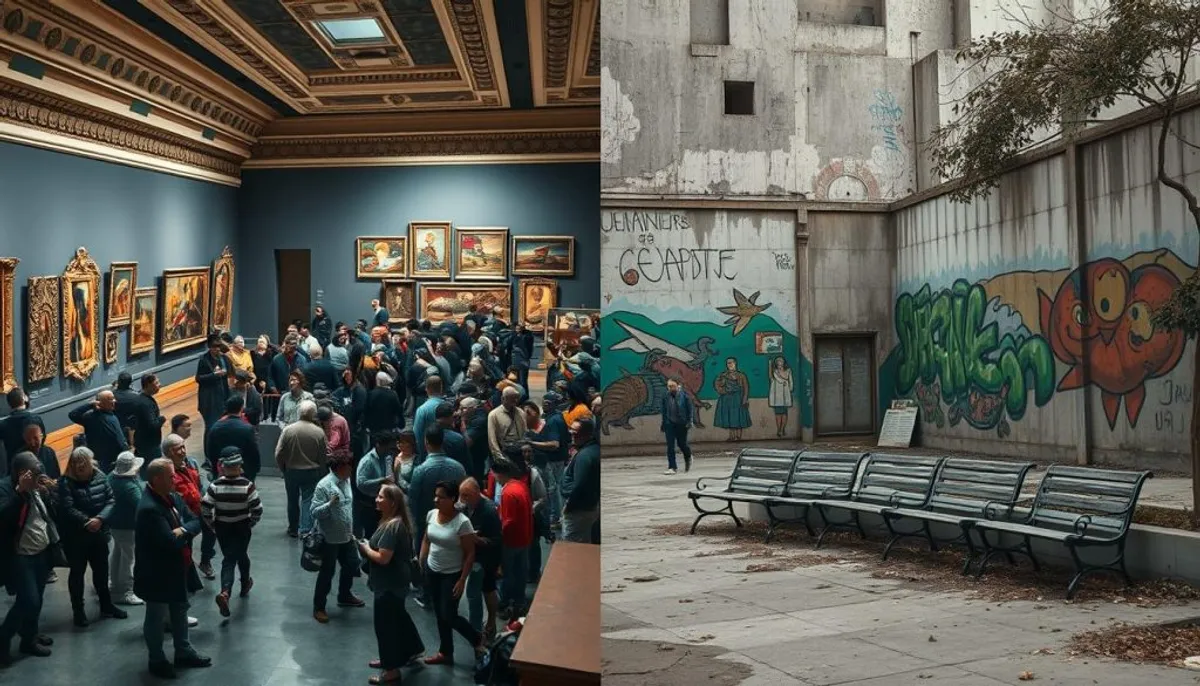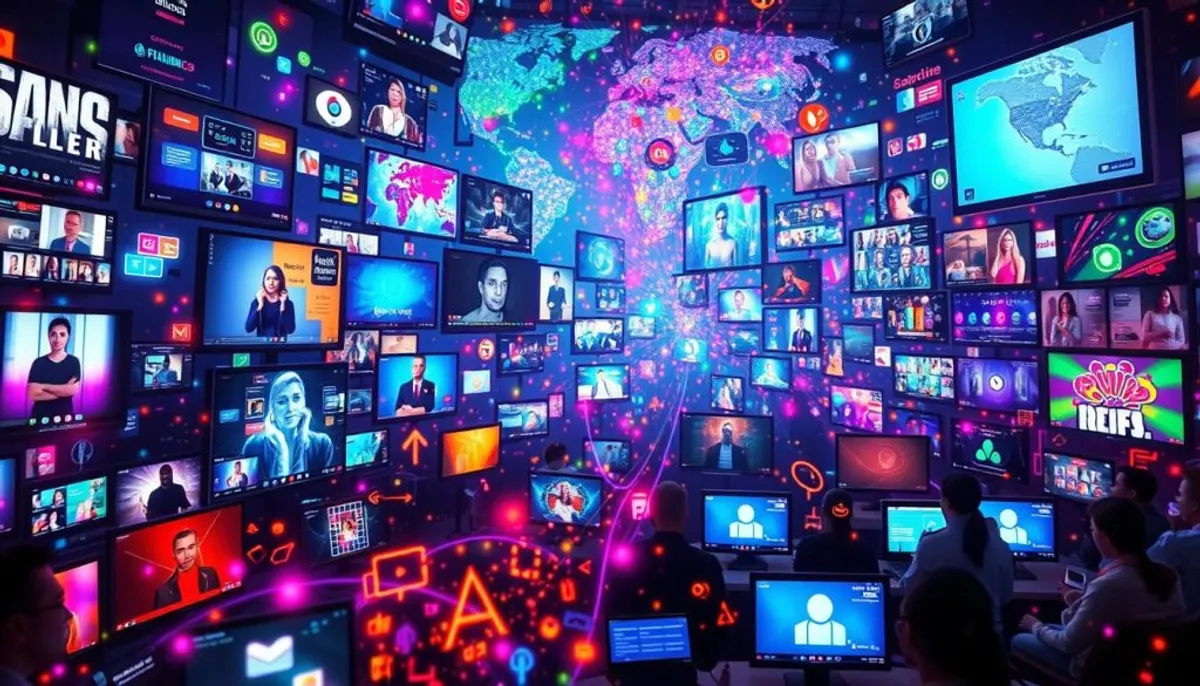In our modern society, the importance of culture continues to grow. It shapes our identity, enriches our daily lives, and influences our social interactions. Cultural value has become an undeniable asset, both personally and professionally.
In 1952, anthropologists Kroeber and Kluckhohn listed over 150 definitions of the word “culture.” This diversity highlights the complexity and richness of this concept. In French, culture encompasses both individual and collective aspects, while in German, "Bildung" (personal culture) and "Kultur" (social heritage) are distinguished.

Cultural value manifests in various areas of our lives. It plays a crucial role in education, serving as a selection criterion in higher education. In the job market, it allows individuals to stand out and enhance their skills. Furthermore, culture promotes open-mindedness and understanding of the world around us.
In our modern society, access to culture has been democratized through digital means. However, disparities persist between urban and rural areas. Public initiatives aim to reduce these gaps, recognizing the importance of culture as a factor of social cohesion and personal development.
The modern definition of culture and its societal importance
The notion of culture has undergone profound transformation over the centuries. It now encompasses a spectrum of elements that shape our current society. Cultural expressions range from traditional arts to modern digital forms.
The different forms of culture in our society
Our society is rich in cultural diversity. It includes visual arts, literature, music, as well as local traditions and lifestyles. UNESCO defines culture as the set of distinctive traits of a society, covering spiritual, material, and intellectual aspects.
The evolution of the notion of culture over time
The understanding of culture has evolved significantly. In the 18th century, it was linked to civilization and progress. Today, it encompasses both popular and elitist culture. This evolution reflects a more inclusive and diverse society.
The impact of culture on personal development
Culture is essential for personal development. It encourages open-mindedness, stimulates creativity, and enriches our understanding of the world. A study shows that companies promoting cultural diversity see a 20% higher employee retention rate.
| Cultural Aspect | Impact on Personal Development |
|---|---|
| Arts | Stimulates creativity and self-expression |
| Literature | Broadens perspectives and develops empathy |
| Traditions | Strengthens the sense of belonging and identity |
| Cultural Diversity | Promotes open-mindedness and tolerance |
Is culture a fundamental value in education?
Culture and education are deeply rooted in the French educational system. Since kindergarten, cultural education is considered an essential pillar. Artistic and musical education is introduced early on, allowing students to discover the arts at a young age.
General culture occupies a central place in the educational journey. It is often a determining criterion for access to prestigious schools, highlighting its role in shaping future leaders. However, access to culture remains unequal, reflecting social disparities.
The French educational system places culture at the heart of its values. The principle of secularism, established in the 19th century, profoundly influences the learning environment. The civic path, which extends from school to high school, educates young people about their rights and duties. This reinforces their cultural education.
| Educational Value | Initiative |
|---|---|
| Citizenship | Universal National Service (SNU) |
| Environment | Combatting climate change |
| Equality | Promotion of gender equality |
| Diversity | Combatting discrimination |
The national education system engages with contemporary themes. It integrates environmental protection and gender equality into its curriculum. These initiatives enrich students' cultural education, preparing them to become informed and engaged citizens.
The accessibility of culture in contemporary France
France is committed to making culture accessible to all. In the face of financial challenges, it relies on public and digital initiatives to democratize culture.
Financial obstacles to cultural access
The high costs of cultural events pose a significant barrier. However, measures are being taken to reduce these barriers. Discounts are offered to students, unemployed individuals, and seniors in many museums and theaters.
Cultural democratization through digital means
Digital technology is essential for making culture accessible. The Google Art Project, for example, allows virtual visits to museums worldwide. This innovation opens a new realm of access to cultural works and knowledge.
Public initiatives to facilitate access to culture
Numerous initiatives aim to broaden access to culture. The TRAM network, active for 40 years, brings together 35 contemporary art structures in Île-de-France. It organizes various events supported by FRAC and DRAC Île-de-France.
| Initiative | Description |
|---|---|
| Libraries of Paris | The majority are equipped to welcome people with disabilities |
| AccessiGames | Game library with accessible games for the visually impaired and blind |
| Access Culture | Makes live performances accessible to blind or visually impaired individuals |
| The Sensory Blowers | Pilot cultural space on disability |
These initiatives illustrate France's commitment to cultural accessibility. They aim to include everyone, regardless of their disability or personal situation.
Culture as a factor of social differentiation
Culture is a fundamental pillar of social stratification in France. Despite efforts to democratize access to culture, inequalities persist. Access to culture varies significantly according to social backgrounds and regions, exacerbating disparities.
The role of culture in social mobility
Culture and social mobility are inseparable. Cultural capital directly influences professional opportunities and social integration. Cultural practices, as shown by Bourdieu in “Distinction,” are marked by social origin. This can hinder the social ascent of certain groups.

Cultural disparities between urban and rural areas
Cultural disparities between urban and rural areas are evident. Major cities, particularly Paris, concentrate the majority of cultural facilities and events. Rural areas, on the other hand, lack infrastructure and cultural programming, widening territorial inequalities.
| Indicator | Urban Areas | Rural Areas |
|---|---|---|
| Number of museums per 100,000 inhabitants | 5.2 | 2.1 |
| Cultural budget per inhabitant (in euros) | 120 | 45 |
| Attendance rate at cultural facilities | 62% | 38% |
These data highlight the disparities in access to culture between cities and countryside. Reducing these cultural inequalities is a major challenge for promoting social and territorial cohesion in France.
Corporate culture: a new societal paradigm
Corporate culture has become a fundamental pillar in today's professional world. It shapes professional identity and profoundly influences the functioning of organizations. Since the 1980s, this concept has gained paramount importance in organizational theory.
Organizational values represent the core of corporate culture. They manifest through five essential elements: the sense of belonging, history, vision, values, and rituals. These components form the cultural fabric of the company, including routines, myths, and symbols.
Corporate culture plays a crucial role in team cohesion and employee engagement. It is transmitted among colleagues and can even extend to an entire profession or industry. For example, the difficult beginnings of Canal+ have left a lasting mark on its employees' spirit, creating a unique identity.
Despite the abundance of research on corporate culture, its application in management remains paradoxically limited. Some experts consider it a fundamental attribute of excellence, while others see it as the foundation of a new organizational paradigm.
Debates on corporate culture raise questions about its autonomy and its relationships with national and sectoral cultures. These discussions demonstrate the growing importance of this concept in our society, making corporate culture a true societal paradigm.
The influence of digital technology on cultural practices
Digital culture is revolutionizing our cultural habits. Modern technologies redefine our creation, sharing, and consumption of art and entertainment.
The transformation of cultural consumption modes
Online cultural consumption is experiencing rapid growth. In 2020, 15% of French people adopted digital cultural practices. Young people are at the forefront of this transformation.
- 59% of 15-24 year-olds watch videos online every day.
- 65% get informed via television and social media.
- Streaming music is replacing physical media.

The emergence of new artistic expressions
Digital technology encourages the emergence of new cultural forms. Digital art, online performances, and transmedia creations are becoming popular. The Harry Potter phenomenon illustrates the union of literature, cinema, video games, and fan interactions.
The democratization of digital tools allows everyone to create. During the lockdown, 71% of 15-24 year-olds engaged in amateur cultural activities. This represents a 14-point increase compared to 2018, but it also raises questions about the derivatives of individualism in cultural creation.
| Cultural Practice | Evolution |
|---|---|
| Watching online videos | Increasing |
| Reading paper books | Decreasing |
| Creating digital content | Significantly increasing |
This digital revolution forces cultural professionals to adapt. Digital mediation, virtual tours, and online resources are becoming essential to reach a connected audience.
The role of culture in national identity
Culture is fundamental in shaping French cultural identity. A survey reveals that 78% of French people view culture as a pillar of their national identity. This perception is reflected in efforts to preserve heritage and adapt to cultural globalization.
The preservation of cultural heritage
National heritage is a major concern for the French. 80% of respondents believe that preserving local cultural traditions is essential for a strong national identity. These convictions are realized through actions to protect historical monuments and transmit artisanal know-how, while promoting social integration.
The influence of globalization on French culture
Cultural globalization has a significant impact on French cultural identity. 45% of French people believe that international cultural exchanges strengthen their sense of belonging. However, 70% think that openness to foreign cultures allows national identity to evolve without dilution.
| Cultural Aspect | Percentage of Importance |
|---|---|
| Culture as an identity value | 78% |
| Cultural diversity | 62% |
| International cultural exchanges | 45% |
| Preservation of traditions | 80% |
| Openness to foreign cultures | 70% |
In the face of challenges, France seeks to find a balance between preserving its heritage and being open to the world. The French cultural exception aims to protect cultural diversity while adapting to the realities of globalization. This ensures the sustainability of French cultural identity.
Conclusion
The importance of culture in our modern society is undeniable. Schools are increasingly integrating general culture tests. They recognize its crucial role in student development. This cultural evolution is reflected in the professional world, where cultural knowledge provides a competitive advantage.
Despite recent challenges, such as the decline in visits to museums and heritage sites in France (from 63.1 million in 2019 to 20.5 million in 2021), culture remains a pillar of our national identity. Current cultural issues include promoting diversity and adapting to new technologies. The use of social networks and ticketing software like Diptick reflects this digital transformation.
In conclusion, culture remains a fundamental value, shaping our society and our future. Its role in education, tourism, and personal development underscores its ongoing importance. In the face of the challenges and opportunities of our time, cultural evolution remains a dynamic process, essential to our collective and individual growth.
RelatedRelated articles


